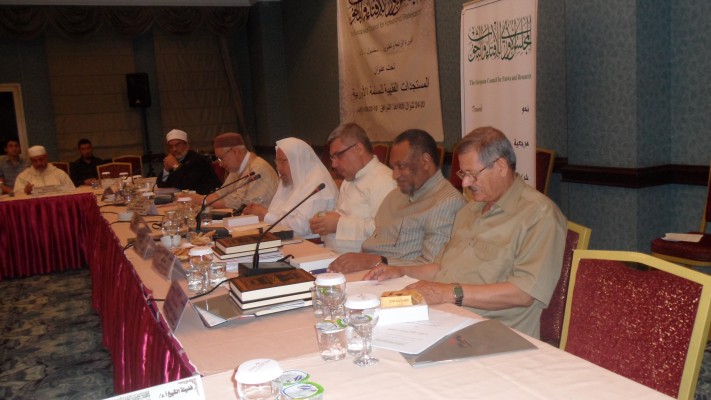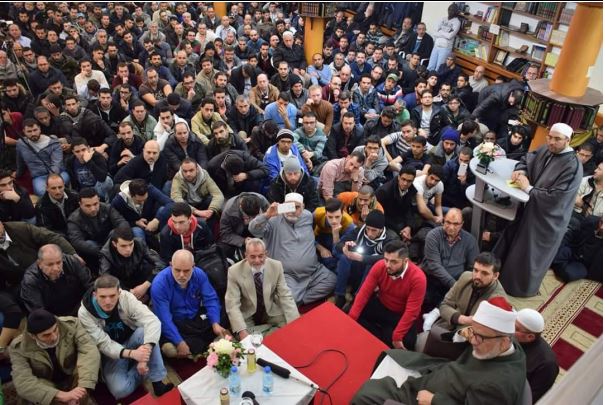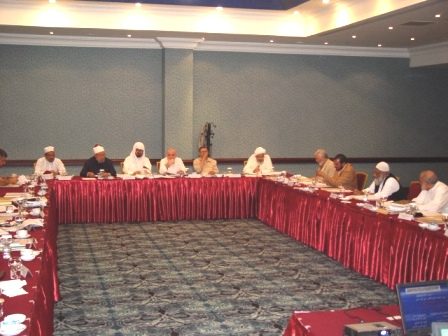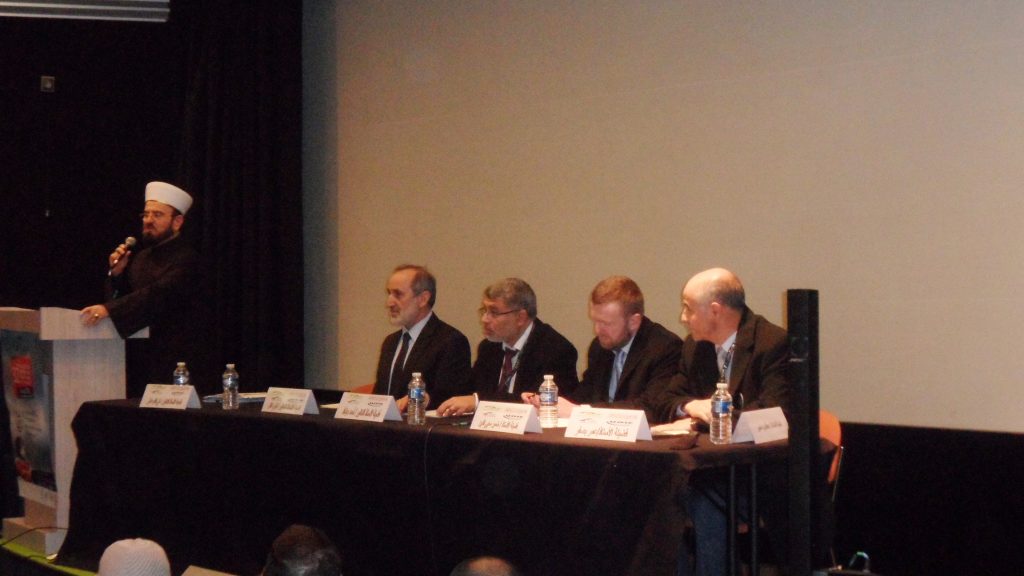The Seventh Session of the European Council for Fatwa and Research
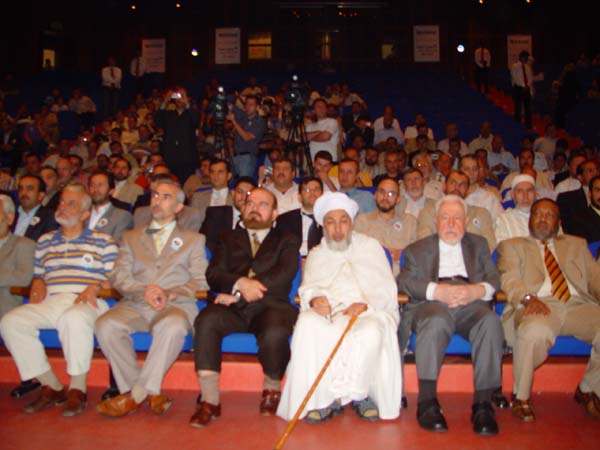
In the Name of Allah, The most Gracious; The Most Merciful
Final Statement
of the Seventh Session of the European Council for Fatwa and Research, held at its Headquarters; The Islamic Cultural Centre, Dublin, from 29 Shawwal – 3 Dhul Qi’da, 1421 AH, corresponding to 24- 27 January 2001
Praise be to Allah, the Lord of the worlds and prayers and peace be upon our leader and guide; Muhammad, his pure descendants and Companions.
By the grace of Allah Almighty, the seventh session of the European Council for Fatwa and Research was convened at its at its Headquarters at the Islamic Cultural Centre in Dublin during the period from 29 Shawwal – 3 Dhul Qi’da, 1421 AH, corresponding to 24- 27January 2001. The session was presided by his Eminence the Honourable Shaykh Yusuf Al-Qaradawi, President of ECFR, and was attended by the majority of its members.
The Council considered its set agenda, which included the periodic report of the General Secretariat, and subsequently made the appropriate decisions and resolutions in regards to the various financial and administrative issues discussed. The Council then considered a number of issues and matters on the agenda, regarding which the relevant and appropriate resolutions were issued, the most prominent of which were:
- Setting the fundamental principles of the ‘Jurisprudence of Minorities’ e. fiqh-ul- aqilliyat.
Two studies were presented to and thoroughly discussed by the Council, upon which a number of principles were approved in regards to this particular jurisprudence. The most prominent of these principles is the preservation of the Islamic identity of Muslim social groups in Europe, the limitations to its opening up to its surrounding environment and the need to exert a positive influence therein. These include preserving and maintaining the unity and unique collective identity of Muslims communities as well as developing the sense of citizenship amongst its members, i.e. Muslims. However, the Council decided to postpone any resolutions in this regard until the issue is further researched and studied, and recommended that the issue of European Citizenship and Islam, be studied further.
- The issue of women who embrace Islam whilst their husbands remain non-Muslims.
This issue was examined and deliberated extensively through four papers presented in this regard, each of which carried a particular view and followed a particular methodology. However, and due to the extraordinary significance and sensitivity of this issue, the Council decided to postpone issuing any resolutions until further studies are conducted in this regard. The Council also recommended that various scholars and figures of knowledge be consulted on this issue.
- Arbitration.
A detailed study was presented to the Council concerning the importance of this issue to Muslims in the West, as it presents a vital means of resolving disputes, whether personal, social or commercial. The Council decided to delegate to one of its specialised members, the duty of presenting a draft organisational constitution for its consideration.
- Various Fatwas.
The Council responded to a number of questions posed by the Muslim public concerning various issues, amongst which were:
- a) Practising sport on a professional basis.
The Council responded to this question, stressing the principle that “Exercising what is permissible professionally, is permissible”, unless clear evidence proves otherwise. Practising sport is, at the very least, permissible, if not recommended or even obligatory. Indeed the Prophet Muhammad, peace and payers be upon him, encouraged the Muslims to practise particular types of sport, which preserve the individual’s health and the Ummah’s strength, unless it somehow leads to harm.
- b) The need to observe the age of the slaughtered animal, i.e. Udhiya or Qurbani.
The Council explained that the reason for determining the age of the sheep or cow to be slaughtered, is to ascertain the extent of benefit achieved, in order for the Qurbani to be sufficient. The age of the animal is certainly one method of determining this, and thus the basic principle is to observe that the animal has indeed reached a particular age. However, in some circumstances, the animal may have achieved sufficient growth before reaching the appropriate age, especially in the case of lambs which grow rapidly in Europe, or feeding cows which grow in several months, whether through natural means or through feeding methods. In such cases, slaughtering these animals as Udhiya is acceptable, because the legal objective of observing age is fulfilled. It is worth noting that this was also approved by a number of famous Maliki scholars. However, the Council calls upon Muslims to observe health and safety issues related to slaughtering animals suffering from disease and illness, such as Mad Cow disease, Foot and Mouth disease and the such, which would pose an obvious health hazard as well as being unacceptable from the Shari’a point of view. In this regard, the Council draws Muslims’ attentions to the following:
- Observing health and safety regulations, which decree the monitoring of a registered veterinarian in all official slaughter houses.
- It is permissible from the Shari’a point of view for a Muslim to authorise another to slaughter an animal on his behalf, or to make a Qurbani in another country, particularly those in which Muslims suffer oppression, famine or extreme need.
- In the event that a Muslim wishing to make a Qurbani cannot do so in the first day of Eid-ul-Adha, it is permissible to perform this ritual up until the fourth day of Eid.
c) The employees right to use public tools and means for his or her personal benefit. The basic principle in regards with public funds, i.e. that of government or private establishments, is that they are not to be infringed upon, particularly that the Qur’an and authentic Hadiths emphasised the severe punishment awaiting those who indulge into such funds without due right. Indeed, Scholars considered these funds similar in status to the money of an orphan, and is thus to be maintained and preserved and not to be touched. However, the exception in this case is that which has become customary practice widely acknowledged and accepted by society, as this implies that there is an implicit and underlying permission. In any case, one must not use this permission extensively, as the basic principle aforementioned stands and remains valid. In addition, a Muslim, who seeks perfection in his religion, ought to refrain from such practices in accordance with the Hadith: “…and whoever remains away from controversial matters, has indeed perfected his religion and reputation”.
- d) Conditions and restrictions on the meetings of men and women.
Meeting, co-operating and integrating between men and women is an instinctive and natural matter, which cannot be averted in reality. Indeed, Islam; the religion of natural instincts and inclinations, conveyed nothing which prevented such meetings from taking place, but rather set the following conditions and restrictions:
- The forbiddance of the meeting of a man and a woman in solitary, i.e. the meeting of a man and a foreign woman in a situation or position invisible to others. This is based upon the Hadith, in which the Prophet Muhammad, peace and prayers be upon him states: “Never are a man and woman in solitary, but with Satan present with them”.
- Avoiding physical contact, so not to lead to sexual arousal.
- Avoiding tabarruj, i.e. revealing parts of the body which Allah Almighty and His Messenger, ppbuh, ordered to be concealed and covered. Thus, according to the majority of scholars, a woman meeting with foreign men, must cover all her body apart from her face and two hands.
- The woman must observe proper conduct in her speech and movement when in the presence of foreign men. Thus, she must not speak or act in a manner which attracts and leads to the arousal of men. Allah Almighty stated: “if you do fear Allah, be not too complaisant of speech, lest one in whose heart is a disease should be moved with desire; but speak a speech which is just”.
As long as men and women abide by these conditions in any meeting or activity, there is nothing to prevent them from doing so, provided that this gathering is a serious and constructive meeting, such as scientific or cultural activities. It is worth noting that these conditions remain valid even if the women involved are non-Muslims, as the possibility of arousal does not subsist. It is also important to note that it is preferable for men and women seating areas to be separate, particularly if no reason calls for any other arrangement.
- e) Charity Organisations benefiting from interest monies of individuals and banks, advertising and opening designated accounts for such monies.
Almost all Muslims in the West find it obligatory to open bank accounts with riba banks, and are thus paid interest on these accounts. In this case, a Muslim finds him or herself with one of two options: either to leave these monies to the bank, which causes many benefits to be missed by Muslims, particularly if these banks support and fund anti-Islamic activities, or to spend these monies in various charitable means. Due to the fact that the reason these monies were deemed haram, is because of the manner in which they were gathered or spent, and not because the money is haram in itself; it remains that it is haram for the person him or herself who accumulated this money. Thus, it is haram for a person who has accumulated interest money to use this money for personal benefit, whilst the money is in no way haram for the poor or for charitable establishments.
Upon this, the Council sees that it is permissible for charitable organisations to ask those who have such accounts for the interest money which they are accumulating. Similarly, the Council finds that it is also acceptable for charitable organisations to obtain these monies from other sources, such as private establishments or banks.
However, these charitable organisations must avoid, as much as possible, mentioning the source of these monies as a means of advertising for that particular source, due to the fact that this establishment is involved in a practice which is unlawful in principle. It is also permissible to open an account in order to collect these monies.
- The Council requested from some of its members to examine and resolve a number of domestic disputes and problems which were brought directly before it, by the parties concerned.
- The Council approved the fatwa issued on the boycott of Israeli and American products, which was previously issued by his Eminence the President of the Council, and which was endorsed and signed by hundreds of scholars. A copy of this fatwa is attached to this statement.
- The Council discussed and approved the action plan submitted by the Research Committee, having agreed a budget for the implementation of its projects, the most important of which are:
- Preparation and publishing of the first issue of majallat al-buhuth; a bi-annual periodical which publishes the studies and research discussed by or of interest to the Council.
- Setting up a web-site for the Council, which would accommodate all its studies, fatwas and resolutions. The web-site is also to receive questions, queries and information, in order that it reflects the reality, problems and interests of Muslims living in Europe.
- Preparation for two scientific seminars
- Preparation of a series of studies related to the Council’s work and to the situation of Islamic minorities in Europe including its political, economic and religious challenges.
- Due to the absence of a number of eminent scholars members of the Council, who had previously submitted papers related to the topic of the stockmarket, life insurance, meat, copyrights of software programmes; it was decided that these topics be referred to later sessions.
- A number of Council members proposed a number of topics to be discussed in the forthcoming sessions, including prayer times in Europe.
- At the end of the session, the Council members agreed, in co-ordination with the General Secretariat, to hold the following session during the period from 24 to 28 Rabi’ II 1422 AH, corresponding to 18 to 22 July 2001.
The Council hereby wishes to remind Muslims in the West once more of its previous recommendations and advice, including:
- The Council calls upon Muslims in Europe to seek the recognition of their respective countries of Islam as a religion, and Muslims as a religious minority similar to other religious minorities who enjoy full rights and dues, including administrating their own personal status regulations, concerning marriage, divorce and the such. Therefore, the Council advises Muslims to establish Shari’a entities which would be capable of organising their personal status affairs according to Islamic Shari’a and in accordance with the laws of the land.
- The Council also reminds and urges Muslims to abide by the texts of the Qur’an, the Sunna and the agreement of scholars, regarding the commitment to fulfilling the agreement upon which they entered these countries, as well as the conditions of citizenship including:
- To believe unconditionally that the lives, wealth and possessions of non-Muslims are not to be breached, according to the agreement by which they entered their respective countries, without which they would never have been allowed to do so. Allah Almighty stated: “and deliver your oaths, as these oaths shall be accounted for”.
- To observe and respect the laws of the countries which gave them accommodation, protection and a respectable and dignified life. Allah Almighty stated: “and is there any reward for good, other than good?”
- To refrain from any and all means of unlawful and illegal earnings, such as the attempts of some to unlawfully seek social security benefits despite being in employment or trade
- To do their utmost to bring up the younger generation, both boys and girls, in a contemporary Islamic way, by establishing schools as well as educational and leisure centres, which would go far in protecting them from leaving the straight path.
- The Council also urges all Muslims, and those living in Europe particularly, to hold tight to the cordon of Allah, to the ties of brotherhood, forgiveness, moderation, cooperation to fulfill all that is good and righteous, politeness and calm debate and peaceful means to resolving problems rather than extreme methods which serve no cause but to distort the image of Islam and Muslims, and add ammunition to the weapons of those who want nothing more than to create and instigate animosity towards Islam and Muslims. Allah Almighty stated: “Call to the way of your Lord in wisdom and beautiful advice and argue with them in ways that are best”.
His Eminence, the President, closed the works of the session by thanking all the brothers who work at the Islamic Cultural Centre in Ireland for their hospitality, warmth and successful organisation of this session. The President also thanked Al-Maktoum Charity Committee for its continuos support of the Council, and the General Secretary for his efforts in preparing for this meeting. The Council also thanked the Irish government for issuing visas to its members, thus allowing for the convention of this session in a satisfactory manner.
Praise be to Allah, The Lord of the Worlds

